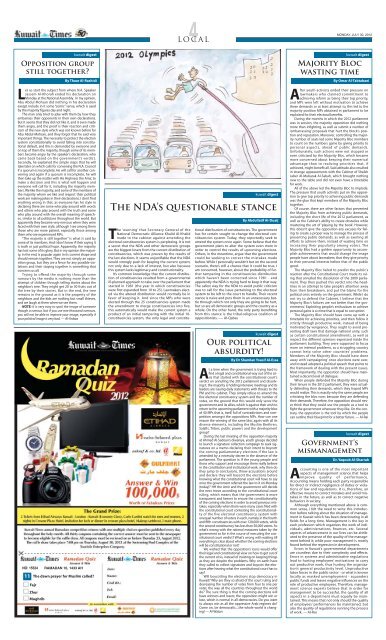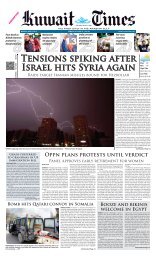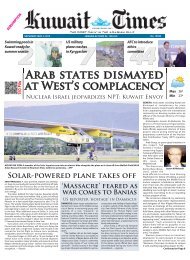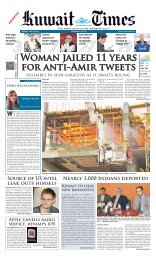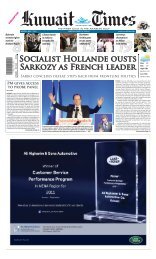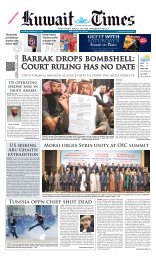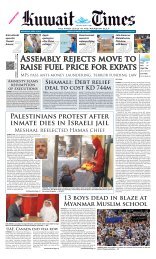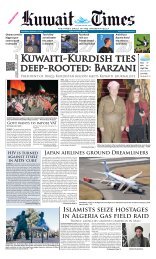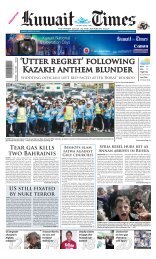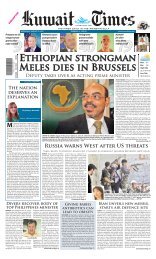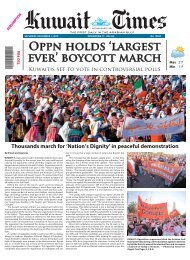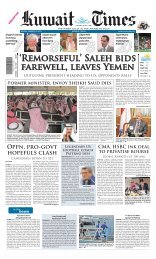UAE widENS cRAckdOwN; MORE ISlAMiStS ... - Kuwait Times
UAE widENS cRAckdOwN; MORE ISlAMiStS ... - Kuwait Times
UAE widENS cRAckdOwN; MORE ISlAMiStS ... - Kuwait Times
You also want an ePaper? Increase the reach of your titles
YUMPU automatically turns print PDFs into web optimized ePapers that Google loves.
kuwait digest<br />
Opposition group<br />
still together?<br />
By Thaar Al-Rashidi<br />
Let us start the subject from where N.A. Speaker<br />
Jassem Al-Khorafi ended his declaration on<br />
Monday at the National Assembly. In my opinion,<br />
Abu Abdul Mohsan did nothing in his declaration<br />
except include in it some “comic” sense, which is used<br />
by the majority figures day and night.<br />
The man only tried to joke with them by how they<br />
embarrass their opponents in their own declarations.<br />
But it seems that they did not like it, and it even made<br />
them angry, and the proof is their reaction and criticism<br />
of the new style which was not known before for<br />
Abu Abdul Mohsan, and they forgot that he said very<br />
important things. The necessity to protect the election<br />
system constitutionally to avoid falling into constitutional<br />
default, and this is demanded by everyone and<br />
on top of them the majority, though some of its members<br />
became angry by the speaker’s declaration, who<br />
came back based on the government’s verdict.<br />
Secondly, he explained the simple steps that he will<br />
take later on which calls for convening the N.A. Council<br />
if a quorum is incomplete. He will call for another convening<br />
and again if a quorum is incomplete, he will<br />
then take up the matter with His Highness the Amir, to<br />
make a decision and this is what will happen and<br />
everyone will call for it, including the majority members.<br />
We like the majority, and some of the members of<br />
the majority whom we like and respect their political<br />
work are making jokes in their declarations. I don’t find<br />
anything wrong in that, as everyone has his style in<br />
declaring there are some who play around with words<br />
and others who play around with the truth and some<br />
who play around with the overall meaning of speeches,<br />
similar to all politicians throughout the world. But<br />
apparently they became very nervous when they were<br />
faced with their own style, although I see among them<br />
those who are more patient, especially those among<br />
them who are experienced MPs.<br />
“The majority is still together” is what is said by<br />
some of its members. And I don’t know if their saying it<br />
is truth or just political hope. Apparently, the majority<br />
has lost some of its glory. But in my opinion the majority,<br />
in the end, is popular again in its current shape and<br />
should remain together. They are not simply an opposition<br />
group, but they are a fence for any possible violations<br />
and their staying together is something that<br />
concerns us all.<br />
Trying to offend the majority through some<br />
rumours by the media is nothing more than the<br />
attempt of children through telling stories about the<br />
neighbor’s tree. They might get 20 to 30 fruits out of<br />
the tree by their stories. But in the end, the tree<br />
remains in the ground as it is the property of the<br />
neighbors and the kids are nothing but small thieves,<br />
and we laugh at them when we see them.<br />
NOTE: It is very easy to spoil the image of someone<br />
though a rumour, but if you use one thousand rumours,<br />
you will not be able to improve your image, especially if<br />
your political image is very bad. — Al-Anbaa<br />
NO: 15524 RAMADAN 10, 1433 AH<br />
11<br />
The dawn prayer for Muslim called?<br />
Fajr<br />
Zhur<br />
Mughrib<br />
The ‘warning’ that Secretary General of the<br />
National Democratic Alliance Khalid Al-Khalid<br />
made to the cabinet against amending the<br />
electoral constituencies system is perplexing. It is not<br />
a secret that the NDA and other democratic groups<br />
are the biggest losers from the current distribution of<br />
constituencies, which was proven by the results of<br />
the last elections. It seems unjustifiable that the NDA<br />
would strongly push for keeping the current system;<br />
not only due to a lack of interest, but also because<br />
this system lacks legitimacy and constitutionality.<br />
It’s common knowledge that the current distribution<br />
of constituencies resulted from a governmental<br />
ill-planned approach to take over the parliament that<br />
started in 1981 (the year in which constituencies<br />
were first expanded from 10 to 25). Lawmakers elected<br />
via the altered distribution would normally be in<br />
favor of keeping it. And since the MPs who were<br />
elected through the 25 constituencies system made<br />
the amendment to merge constituencies into five,<br />
this automatically would make the current system a<br />
product of an initial tampering with the initial 10constituencies<br />
system, the only legal and constitu-<br />
LOCAL<br />
kuwait digest<br />
The NDA’s questionable stance<br />
By Abdullatif Al-Duaij<br />
tional distribution of constituencies. The government<br />
has for certain sought to change the electoral constituencies<br />
system. Today, they reportedly seek to<br />
amend the system once again. Some believe that the<br />
government plans to alter the system even more in<br />
order to control the results of upcoming elections.<br />
Others, in the meantime, argue that the government<br />
could be seeking to correct the mistakes made<br />
before. While I personally wouldn’t bet on the second<br />
scenario, there’s still a chance that it could be true. I<br />
am concerned, however, about the probability of further<br />
tampering in the constituencies distribution<br />
which haven’t been corrected since 1981 - and<br />
apparently the NDA is trying hard to keep it that way.<br />
The safest way for the NDA to avoid public criticism<br />
was to call for the issue pertaining to the electoral<br />
system to be left to the court to handle. Their recent<br />
stance is naive and puts them in an unnecessary battle<br />
through which not only they are going to be hurt,<br />
but so are all democratic groups and the country as a<br />
whole. On the other hand, the only party benefiting<br />
from this stance is the tribal-religious coalition of<br />
oppositionists. —- Al-Qabas<br />
kuwait digest<br />
Our political<br />
absurdity!<br />
By Dr Shamlan Yousif Al-Essa<br />
At a time when the government is trying hard to<br />
find a legal and constitutional way out of the crisis<br />
that started with the constitutional court’s<br />
verdict on annulling the 2012 parliament and dissolving<br />
it, the majority is holding intensive meetings and its<br />
leaders are issuing daily statements with threats to the<br />
PM and his cabinet. They simply refuse to amend the<br />
five electoral constituency system and the number of<br />
votes, on the ground that this would only serve the<br />
government and its allies, which is against their wish to<br />
return to the upcoming parliament with a majority bloc<br />
of 40 MPs that is, itself, full of contradictions and competition<br />
amongst the oppositions MPs. How can one<br />
ensure the winning of the same bloc again with all its<br />
diverse elements, including the Muslim Brethren,<br />
Salafis, Tribes, public powers and the development<br />
group?<br />
During the last meeting of the opposition majority<br />
at Ahmed Al-Sadoun’s diwaniya, youth groups decided<br />
to launch a signature collection campaign to seek signatures<br />
on a memo declaring their intent to boycott<br />
the coming parliamentary elections if the law is<br />
amended by a necessity decree in the absence of the<br />
parliament. The question is: If the young people and<br />
those who support and encourage them really believe<br />
in the constitution and institutional work, why then do<br />
they jump to conclusions, throw accusations around<br />
and declare they will boycott the elections before<br />
knowing what the constitutional court will have to say<br />
once the government referred the law to it on Monday<br />
(today)? HH the Amir and the government will decide<br />
the next move according to the constitutional court<br />
ruling, which means that the government is more<br />
transparent and keener to ensure the constitutionality<br />
of the coming elections in order to avoid previous mistakes,<br />
especially when there were many cases filed with<br />
the constitutional court contesting the constitutionality<br />
of the five electoral constituency system with<br />
unequal number of voters in each, namely in the fourth<br />
and fifth constituencies with over 120,000 voters, while<br />
the second constituency has less than 50,000 voters. So<br />
what’s wrong with the rational measures taken by the<br />
government so far in the course of executing the constitutional<br />
court verdict? What’s wrong with waiting till<br />
everything is clear about whether the coming elections<br />
will be constitutional or not?<br />
We wished that the opposition’s icons would offer<br />
their legal and constitutional view on how to get out of<br />
the current crisis, instead of insisting on keeping things<br />
as they are despite the problems. Why on earth have<br />
they called to collect signatures and boycott the elections<br />
after hearing what the constitutional court has to<br />
say?<br />
Will boycotting the elections stop democracy in<br />
<strong>Kuwait</strong>? Why are they so afraid of the court ruling and<br />
decreasing the number of votes from four to one per<br />
voter, the way all the countries throughout the world<br />
do? The sure thing is that the coming elections will<br />
have winners and losers; the opposition might win or<br />
lose, which is normal in all democracies. Do you want<br />
to always win as all the oppressive Arab regimes do?<br />
Come on, be democratic....the whole world is changing!<br />
— Al-Watan<br />
MONDAY, JULY 30, 2012<br />
kuwait digest<br />
Majority Bloc<br />
wasting time<br />
By Omar Al-Tabtabaei<br />
After youth activists ended their pressure on<br />
lawmakers who claimed commitment to<br />
achieving reform as being their top priority,<br />
and MPs were left without motivation to achieve<br />
these demands or at least attempt to, this led to the<br />
majority position MPs obtained in parliament to be<br />
exploited for their electoral benefits.<br />
During the months in which the 2012 parliament<br />
was in session, the majority opposition did nothing<br />
more than infighting, as well as submit a number of<br />
‘embarrassing’ proposals that hurt the block’s position<br />
and reputation. Moreover, controlling the majority<br />
number of seats led some Majority Bloc members<br />
to count on the numbers game by giving priority to<br />
personal aspects, ahead of public demands.<br />
Unfortunately, such actions were not stopped or<br />
even criticized by the Majority Bloc, which became<br />
more concerned about keeping their numerical<br />
advantage than to realizing priorities that, if<br />
achieved, might benefit all. Said attitude also resulted<br />
in strange appeasements with the Cabinet of Sheikh<br />
Jaber Al-Mubarak Al-Sabah, which brought nothing<br />
new to the table and did not even have a timetable<br />
for work.<br />
All of the above led the Majority Bloc to implode.<br />
The pressure that youth activists put on the opposition<br />
to give top priority to achieving public demands<br />
was the glue that kept members of the Majority Bloc<br />
together.<br />
Of course, there are other factors that prevented<br />
the Majority Bloc from achieving public demands,<br />
including the short life of the 2012 parliament, as<br />
well as the Cabinet’s ability to create obstacles while<br />
mastering the art of ‘playing by the book’. However,<br />
this doesn’t give the opposition any excuses for failing<br />
to create a proper way to manage the process of<br />
presenting public demands, as well as exerting all<br />
efforts to achieve them, instead of wasting time on<br />
increasing their popularity among voters. The<br />
Majority Bloc had a golden opportunity to accomplish<br />
achievements that would change the image<br />
people have about lawmakers; that they give priority<br />
to their personal interests before that of the public<br />
good.<br />
The Majority Bloc failed to predict the public’s<br />
reaction after the Constitutional Court made its ruling<br />
that annulled the dissolution of the 2009 parliament.<br />
They then pushed this verdict into the headlines<br />
in an attempt to take people’s attention away<br />
from their breakdown, and put the blame for the<br />
political crisis entirely on the government. While I do<br />
not try to defend the Cabinet, I believe that the<br />
Majority Bloc’s failures are not better than the governments’.<br />
Exploiting people’s enthusiasm to achieve<br />
personal gains is a crime that is equal to corruption.<br />
The Majority Bloc should have come up with a<br />
timetable for achieving priorities, and then follow it<br />
strictly through productive work, instead of being<br />
motivated by vengeance. They ought to avoid presenting<br />
draft laws that damage national unity, such<br />
as certain constitutional amendments, as well as<br />
respect the different opinions expressed inside the<br />
parliament building. They were supposed to focus<br />
more on internal problems, as a struggling country<br />
cannot help solve other countries’ problems.<br />
Members of the Majority Bloc should have done<br />
away with ‘campaigning’ once elections were over,<br />
and instead adopted a political speech that points to<br />
the framework of dealing with the present issues.<br />
Most importantly, the opposition should have maintained<br />
a decent level of dialogue.<br />
When people defended the Majority Bloc during<br />
their tenure in the 2012 parliament, they were actually<br />
defending their demands, which they hoped MPs<br />
would realize. This is exactly why the same people are<br />
criticizing the bloc now; because they are defending<br />
their demands. Therefore, the opposition should never<br />
think that they could use the people as a tool to<br />
fight the government whenever they like. On the contrary,<br />
the opposition is the tool by which the people<br />
can outline their blueprint for a better future. — Al-Rai<br />
kuwait digest<br />
Government’s<br />
mismanagement<br />
Dr. Yaqoub Al-Sharrah<br />
Accounting is one of the most important<br />
aspects of management science that helps<br />
improve quality of performance.<br />
Accounting means holding each party responsible<br />
for direct or indirect negligence of duties or violations<br />
of law and regulations. It is, therefore, an<br />
effective means to correct mistakes and avoid mistakes<br />
in the future, as well as to correct negative<br />
behaviors in society.<br />
Although everything mentioned above is common<br />
sense, I felt the need to write this introduction<br />
before talking about the situation of management<br />
in <strong>Kuwait</strong> which has been deteriorating in all<br />
fields for a long time. Management is the key in<br />
each profession which organizes the work of individuals,<br />
administrations, finances, etc. Several<br />
aspects of advancement in our lives can be attributed<br />
to the presence of the quality of the management<br />
behind it; while poor management is mostly<br />
found behind the regression in development.<br />
Errors in <strong>Kuwait</strong>’s governmental departments<br />
are countless due to their complexity and effects.<br />
Errors in systems and administrative regulations<br />
lead to hurting employees’ motivations to carry<br />
out productive work, thus hurting the organization’s<br />
general productivity level. Unproductive<br />
labor forces in the public sector - or what is known<br />
locally as masked unemployment - squanders<br />
public funds and leaves negative influences on the<br />
role of productive employees. Therefore, management<br />
science experts believe that in order for<br />
management to be successful, the quality of all<br />
aspects in a department must equally be maintained.<br />
This means that not only should the quality<br />
of employees’ performances be maintained, but<br />
also the quality of regulations running the process<br />
of work. — Al-Rai


